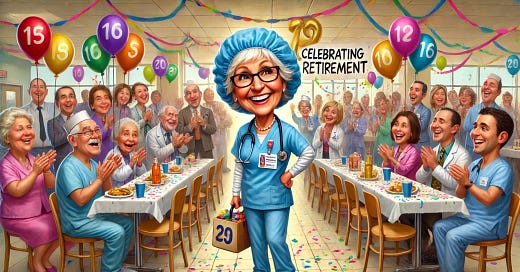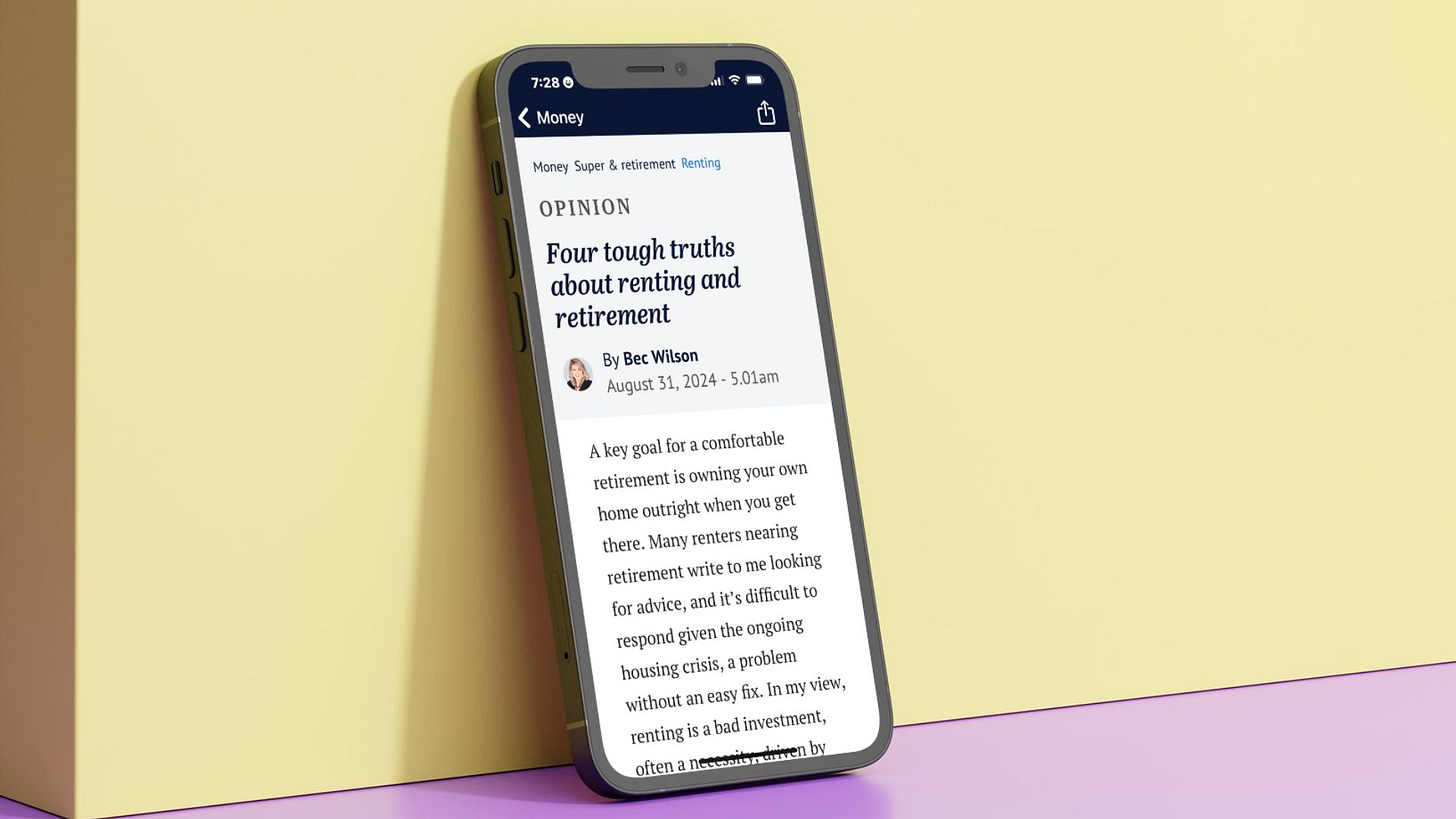Hitting preservation age: 'Should I retire then pick up part time work?'
And, in today's newspapers, four really tough truths about renting and retirement.
In this edition
Feature: Hitting preservation age: 'Should I retire then pick up part time work?'
From Bec’s Desk: wild weather ahead
SMH/The Age: Four tough truths about renting and retirement (seriously… read the digital edition of this story in full - some 💔 stories)
Prime Time podcast: The do's and don'ts of a South East Asian sabbatical
Hitting preservation age: 'Should I retire then pick up part time work?'
Hi Bec. I have a question for you. I reach my retirement preservation age of 60 next week. Yay! Cutting back days in my 60-70 hour week isn’t an option, however I do have offers for part time work elsewhere.
I’ve read a little about tax implications if it is deemed I have not actually retired.
I would like to retire, pay off my mortgage, and then pick up another job 2-3 days per week, probably within 3 months. Is that within the regulations around retirement and super? — Sue E.
Hey Sue! Congrats on hitting your retirement preservation age—exciting times ahead! Let’s dive straight into your question because it’s a really good one!
When you reach your preservation age (which is 60 for everyone in Australia now), you can access your superannuation if you meet a ‘condition of release’. One of the most common conditions of release is ‘retirement’. For the tax office and your super fund to consider you officially ‘retired,’ you generally need to genuinely finish up your employment and not have any agreement in place to work afterwards. Then, you can complete the form with your superfund to transfer your superannuation from the accumulation phase into a retirement phase account. There’s a cap of $1.9M (called the transfer balance cap) on how much you can transfer to retirement phase during your lifetime. If you do this, you can access your super as a lump sum or start drawing down from it from the age of 60.
There’s a few important things to be aware of:
Taking up another job: You can retire, legitemately, access your super and then decide afterwards that retirement isn’t for you and pick up some work - part time or full time. Funds tell me the important thing is not to have agreements in place prior to going through the process of retiring with your fund. The process itself is pretty simple— a form with a tick box that asks you if you’re retiring. But ultimately, you’re reporting your status to the ATO, which is important to do correctly and with integrity. Just talk to the financial adviser at your fund. They’re pretty keen to help people get the transition from accumulation to retirement right.
What happens if you’re not retired? If you don’t meet the retirement condition when you complete the form with your superfund, your super could be deemed "not preserved," meaning any withdrawals might be subject to tax penalties. Again - funds really know how to help you navigate this — and it sounds like you are actually legitemately retiring — so ask them to guide you through.
Transition to retirement (TTR): If you’re not sure about fully retiring, consider starting a TTR income stream. This lets you draw down from your super, up to 10% of your balance each year—while still working part-time. It’s tax-effective and could give you the flexibility you need. Ultimately though, if you want to be able to make a lump sum drawdown to pay off your mortgage, you can’t with a TTR account.
Compulsory drawdowns: Remember, once you kick off a retirement phase account you need to withdraw the mandatory drawdown from your super fund every year. This is an amount that starts at 4% from age 60-64 and goes up as you get older. For most people accessing this drawdown is actually the goal, but for some feeling forced to draw down their retirement savings to a required level is a surprise.
I hope that insight helps— it really is a great question. When I chat with the superfund financial advisers - they’re eager to help people navigate this step without fear, and do it correctly. So don’t hesitate to book a call in with your fund’s general advice team and ask about it.
Cheers, congratulations on hitting preservation age - now get out there and make it epic! Bec Xx
So many wonderful things are happening. I feel blessed this week.
The Epic Retirement Flagship Course is up to week 4. Last week we had David Lane the QLD State Manager and Senior Adviser from Ord Minnett for our Live Q&A event - and we ran over the hour because we had SO MANY QUESTIONS! I love it when it rains questions in a live event! In the week ahead for our live event we have Jen Harding, the GM of Advice, Development and Growth at HESTA to answer questions about super and the help people can expect from their super funds.
If you’d like to do the course, we will only be holding one more 6 week program this year — in October/November. It will launch in the next few weeks and the first-booked will get the best prices. Register your interest here.
—
This week I spoke at the Nillumbik Seniors Housing Forum in Eltham, Victoria. It was a hoot. 130 people all hungry for very current insights on how to navigate downsizing, when to downsize and what their options really are. And I got halfway through a new speech before the crazy Melbourne weather came in, blew out the power and made me rest on my knowledge and present without slides. I actually think we all had an even better time learning from that point on - without the formality of the slide show and with the intimacy of working through each lesson together! And we got real with on-the-fly questions and answers too!
—
This week I’ve done a story in The Age and The Sydney Morning Herald that I’ve been mulling for weeks or even months. People have asked me to address renting and retirement and I didn’t want to do so unless what I wrote could help — and it’s not an easy thing to do. So have a read. It certainly taught me a few things immersing myself in the issues, choices and stories of the people who rent today, thinking about what they can and can’t do tomorrow! — [Even if you get the paper in print, read the digital edition on this one -shared below — it’s longer and has more real life stories].
—
I’ve done it - I’ve kicked off a new Epic Retirement International newsletter. It went out for the first time on Friday. So if you’re an international person, lurking here to find out what an Epic Retirement is all about, you can now join a dedicated newsletter that’s completely separate with 23,000+ other people who’ve been asking for it (yes! really). The first piece is foundational - ‘There’s six pillars of an Epic Retirement’. Read it here and sign up free. (And it’s ok to choose to get just one newsletter - the Aussie or the International). The international won’t be as frequent as my Aussie one!
—
QBD have this quarter included How to Have an Epic Retirement in their local author celebration and campaign. That means I’ll be dropping into QBD bookstores all over the place to say ‘hi’, and signing copies of the book as I go. So keep an eye out. Such a thrill to see the book being supported, read and enjoyed. You can find plenty of copies in QBD stores and online here too.
—
And finally - I’m taking a few days later this week away from the desk to go on a four-day hike along the Three Capes in Tassie with the Tasmanian Walking Company. The weather is really going to make this fun. The current weather report is calling for Spring sleet, snow and extraordinary winds over the week ahead. So my husband and I are excited, not just for the 50kms of hiking, the beautiful cabins and local cuisine, dotted through some of the most picturesque countryside in Australia. We’re also really looking forward to the crisp, wild experience of the outdoors that lies ahead. I’ll post pics on my public Facebook profile if you want to follow along. Hiking in snow is a first for me.
And alongside all this, I’m writing furiously, aiming for that book deadline like there’s no tomorrow.
Have a great week ahead. You can always email me at bec@epicretirement.com.au. I love getting your letters. Until next week… make it epic!
Many thanks! Bec Wilson
Author, podcaster, guest speaker, retirement educator … Visit my website for more info about me, here.
Four tough truths about renting and retirement
Extract of article published in print in The Age, The Sydney Morning Herald, Brisbane Times, WA Today on Sunday 1st September 2024.
A key goal for a comfortable retirement is owning your own home outright when you get there. Many renters nearing retirement write to me looking for advice, and it’s difficult to respond given the ongoing housing crisis, a problem without an easy fix. In my view, renting is a bad investment, often a necessity, driven by circumstance rather than desire.
But this week, I decided to dive deeper and asked some people who rent, why they do it. Some of their stories are sad, while others show the tradeoffs people are making. The truth is, renting can teach you some pretty hard lessons. Here are four of the biggest ones.
Lesson 1: Renting has no finish line
Let’s be honest: renting sucks. There’s no end in sight, no moment where you can sit back and say, “I’ve made it.“ Every year or two, when your lease comes up, you get that knot in your stomach, wondering if the rent will go up or if the landlord will decide to sell. It’s a never-ending cycle of uncertainty. And it’s worse when you’re older.
Take Susan, who’s 70 and living on Melbourne’s northern fringe. She’s widowed, broke, and relying on the single age pension after her husband’s business went under during COVID, and he died of a heart attack not long after.
She had to sell everything they owned. Now, she’s moved out of the city, away from her friends and community to be able to find a place to rent for $370 per week, which she affords thanks to some help from rent assistance.
It took her a year of lining up at rental inspections and submitting applications to find a place because landlords took one at her application as a single woman on the full age pension and offered it to someone younger or more affluent. She lives in constant fear that her lease won’t be renewed.
Lesson 2: Home ownership remains the best way to build wealth
Owning a home used to be the great Australian dream, but the data points out that buying a home in the inner circles of our capital cities is unreachable for average young people in Australia right now.
They can’t scrabble together the scale of deposit a bank wants them to have to underpin a large loan. They can’t afford the enormous mortgage with six per cent interest rates on their average salaries.
And yet, despite this mess, owning a property could be the single greatest way of creating wealth ever in our economy. There are three simple reasons why: every dollar of capital growth you make on your home is capital gains tax-free for your entire life, and the amount of leverage you can take on your family home is higher than the leverage available in any other asset class, so when it grows, your wealth grows –fast quickly.
If you’re middle-aged and mortgage-free or close to it, count your blessings.
Paying a principal and interest mortgage is the most diligent long-term savings regime most people enter into voluntarily.
Over the last 30 years residential property has grown by an average of 5.2 per cent per year. And remember, all of that growth, if made in your principal place of residence is capital gains tax-free.
Jen, 28 and Greg, 29, are renting in inner Melbourne and have given up hope on buying a home for now. They’re young and working hard with a household income of $130,000 between them after tax and their rent is $42,000 per year.
They’ve grown up in Richmond, and lived all their lives in the surrounding suburbs of inner Melbourne, so that’s where their roots are and where they’d want to buy.
If they took out a mortgage on a small apartment they’d expect to be paying closer to $60,000 in repayments a year, and then they’d have to pay body corporate fees too. They’re afraid of getting themselves into financial hot water they can’t deal with.
They feel sick about not-buying, but they need to recognise that they still have time and choice – time to save up a deposit, to rethink their inner-city ambitions and move a bit further out of the inner city to a more affordable suburb if they’re brave enough.
Or, they might even consider getting themselves on the housing ladder earlier by buying an investment property in a suburb with good rental returns.
Lesson 3: Renting can be a financial and lifestyle choice – really
This article continues.
Read the rest of this article here in The Age, The Sydney Morning Herald, Brisbane Times, WA Today. It also appears in the print editions.
The do’s and don’ts of a South East Asian sabbatical
This week on Prime Time, we dive into the art of taking a midlife sabbatical with Mel Pike. At 53, Mel took extended leave from her public service role and spent five months living near Kata Beach in Thailand, using the time to decompress and rediscover what she wanted from the next stage of her life. We’ll explore her entire journey—from how she saved for it to what she did during her stay—and share plenty of insights along the way. It’s an inspiring story with lessons we can all take to heart.
LISTEN TO THIS EPISODE OF THE PODCAST HERE:













Hi Bec, for someone with $400k super so eligible for as good as full pension, I've thought could be worth considering to rent using income from Super, get full pension+ rental assistance, vs struggling on pension to pay ever increasing insurance ( talking nth Qld here) and other household costs. With no requirement to leave a bequest and the super would be there as emergency funds if needed. Vs using that $400 to buy a home.
I understand that rental can be insecure but owning a home is not a guarantee either sometimes....I'd be interested in your thoughts please
Good article Bec. I have a female relative in their 60s in this situation who is very anxious about retiring and job security as they age. They always planned to move away to a lower cost area on retirement but as regional areas become more unaffordable that likely will not be a viable a option, particularly as they will need to work beyond the pension age. I worry about it all too